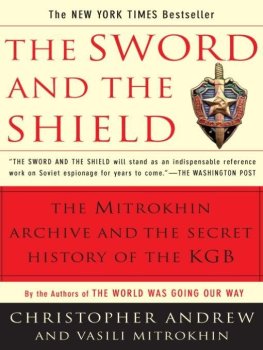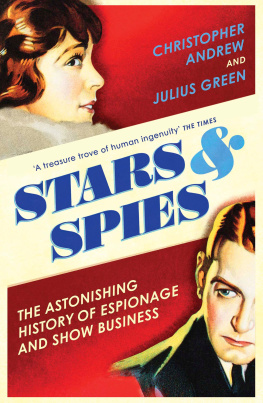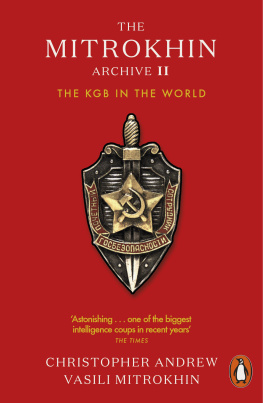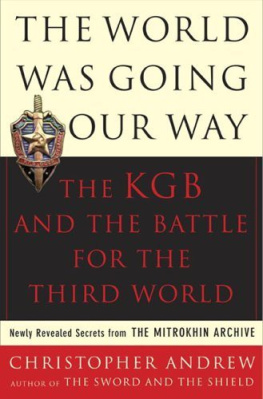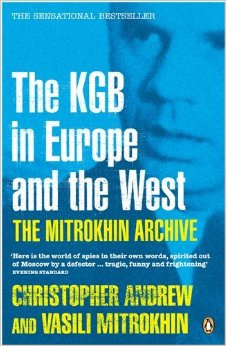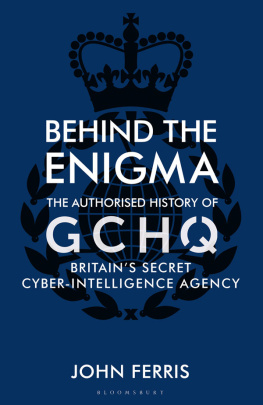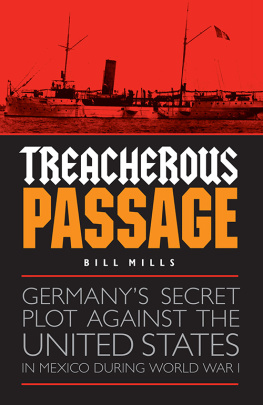Christopher Andrew and Vasili Mitrokhin
THE SWORD AND THE SHIELD
The Mitrokhin Archive and the Secret History of the KGB


ABBREVIATIONS AND ACRONYMS
AFSA Armed Forces Security [SIGINT] Agency [USA]
AKEL Cyprus Communist Party Amtorg American-Soviet Trading Corporation, New York
ASA Army Security [SIGINT] Agency [USA]
AVH Hungarian security and intelligence agency
AVO predecessor of AVH
BfV FRG security service
BND FRG foreign intelligence agency
CDU Christian Democratic Union [FRG]
Cheka All-Russian Extraordinary Commission for Combating Counter-Revolution and Sabotage: predecessor KGB (1917-22)
CIA Central Intelligence Agency [USA]
COCOM Coordinating Committee for East-West Trade
Comecon [Soviet Bloc] Council for Mutual Economic Aid Comintern Communist International
CPC Christian Peace Conference
CPC Communist Party of Canada
CPCz Communist Party of Czechoslovakia
CPGB Communist Party of Great Britain
CPSU Communist Party of the Soviet Union
CPUSA Communist Party of the United States of America
CSU Christian Social Union [FRG: ally of CDU]
DCI Director of Central Intelligence [USA]
DGS Portuguese security service
DGSE French foreign intelligence service
DIA Defense Intelligence Agency [USA]
DLB dead letter-box
DRG Soviet sabotage and intelligence group
DS Bulgarian security and intelligence service
DST French security service
F Line Special Actions department in KGB residencies
FAPSI Russian (post-Soviet) SIGINT agency
FBI Federal Bureau of Investigation [USA]
FCD First Chief [Foreign Intelligence] Directorate, KGB
FCO Foreign and Commonwealth Office [UK]
FRG Federal Republic of Germany
GCHQ Government Communications Head-Quarters [British SIGINT Agency]
GDR German Democratic Republic
GPU Soviet security and intelligence service (within NKVD, 1922-3)
GRU Soviet Military Intelligence
GUGB Soviet security and intelligence service (within NKVD, 1943-43)
Gulag Labour Camps Directorate
HUMINT intelligence from human sources (espionage)
HVA GDR foreign intelligence service
ICBM intercontinental ballistic missile
IMINT imagery intelligence
INO foreign intelligence department of Cheka/GPU/OGPU/ GUGB, 1920-1941; predecessor of INU
INU foreign intelligence directorate of NKGB/GUGB/MGB, 1941-54; predecessor of FCD
IRA Irish Republican Army
JIC Joint Intelligence Committee [UK]
K-231 club of former political prisoners jailed under Article 231 of the Czechoslovak criminal code
KAN Club of Non-Party Activists [Czechoslovakia]
KGB Soviet security and intelligence service (1954-1991)
KHAD Afghan security service
KI Soviet foreign intelligence agency, initially combining foreign intelligence directorates of MGB and GRU (1947-51)
KKE Greek Communist Party
KKE-es breakaway Eurocommunist Greek Communist Party
KOR Workers Defence Committee [Poland]
KP Austrian Communist Party
KR Line Counter-intelligence department in KGB residencies
LLB live letter box
MGB Soviet Ministry of State Security (1946-54)
MGIMO Moscow State Institute for International Relations
MI5 British security service
MI6 alternative designation for SIS [UK]
MOR Monarchist Association of Central Russia (The Trust)
N Line Illegal support department in KGB residencies
NATO North Atlantic Treaty Organization
NKGB Peoples Commisariat for State Security (Soviet security and intelligence service, 1941 and 1943-6)
NKVD Peoples Commisariat for Internal Affairs (incorporated state security, 1922-3, 1934-43)
NSA National Security [SIGINT] Agency [USA]
NSC National Security Council [USA]
NSZRiS Peoples [anti-Bolshevik] Union for Defence of Country and Freedom
NTS National Labour Alliance (Soviet migr social-democratic movement)
Okhrana Tsarist security service, 1881-1917
OMS Comintern International Liaison Department
OSS Office of Strategic Services [USA]
OT Operational Technical Support (FCD)
OUN Organisation of Ukrainian Nationalists
OZNA Yugoslav security and intelligence service
PCF French Communist Party
PCI Italian Communist Party
PCP Portuguese Communist Party
PFLP Popular Front for the Liberation of Palestine
PIDE Portuguese Liberation Organization
PLO Palestine Liberation Organization
POUM Workers Unification Party (Spanish Marxist Trotskyist Party in 1930s)
PR Line political intelligence department in KGB residences
PSOE Spanish Socialist Party
PUWP Polish United Workers [Communist] Party
RCMP Royal Canadian Mounted Police
ROVS [White] Russian Combined Services Union
RYAN Raketno-Yadernoye Napadenie (Nuclear Missile Attack)
SALT Strategic Arms Limitation Talks
SAM Soviet surface-to-air missile
SB Polish Security and intelligence service
SCD Second Chief [Internal Security and Counter-Intelligence] Directorate, KGB
SDECE French foreign intelligence service; predecessor of DGSE
SDI Strategic Defense Initiative (Star Wars)
SED Socialist Unity [Communist] Party [GDR]
SIGINT intelligence derived from interception and analysis of signals
SIS Secret Intelligence Service [UK]
SK Line Soviet colony department in KGB residencies
SKP Communist Party of Finland
SOE Special Operations Executive [UK]
SPD Social Democratic Party [FRG]
Spetsnaz Soviet special forces
SR Socialist Revolutionary
S&T scientific and technological intelligence
Stapo Austrian police security service
Stasi GDR Ministry of State Security
Stavka Wartime Soviet GHQ/high command
StB Czechoslovak security and intelligence service
SVR Russian (post-Soviet) foreign intelligence service
TUC Trades Union Congress [UK]
UAR United Arab Republic
UB Polish security and intelligence service; predecessor of SB
UDBA Yugoslav security and intelligence service; successor to OZNA
VPK Soviet Military Industrial Commission
VVR Supreme Military Council [anti-Bolshevik Ukranian underground]
WCC World Council of Churches
WPC World Peace Council
X Line S&T department in KGB residencies
THE EVOLUTION OF THE KGB, 1917-1991

The term KGB is used both generally to denote the Soviet State Security organisation throughout its history since its foundation as the Cheka in 1917 and, more specifically, to refer to State Security after 1954 when it took its final name.
THE TRANSLITERATION OF RUSSIAN NAMES
We have followed a simplified version of the method used by the U.S. Board on Geographic Names and BBC Monitering Service. Simplifications include the substitution of y for iy in surnames (Trotsky rather than Trotskiy) and of i for iy in first names (Yuri rather than Yuriy). The y between the letters i and/or e is omitted (for example, Andreev and Dmitrievichnot Andreyev and Dmitriyevich), as is the apostrophe used to signify a soft sign.
In cases where a mildly deviant English version of a well-known Russian name has become firmly established, we have retained that version, for example: Beria, Evdokia (Petrova),

